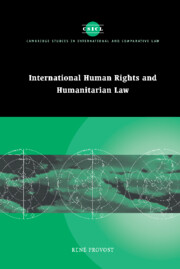Book contents
- Frontmatter
- Contents
- Acknowledgments
- Table of cases
- Table of treaties
- Table of other international instruments
- Introduction
- PART I Normative frameworks
- PART II Reciprocity
- PART III Application: law and facts
- Introduction
- 6 Areas of legal indeterminacy
- 7 Legal effect of characterisation
- Conclusion to Part III
- General conclusion
- Bibliography
- Index
- CAMBRIDGE STUDIES IN INTERNATIONAL AND COMPARATIVE LAW
6 - Areas of legal indeterminacy
Published online by Cambridge University Press: 07 September 2009
- Frontmatter
- Contents
- Acknowledgments
- Table of cases
- Table of treaties
- Table of other international instruments
- Introduction
- PART I Normative frameworks
- PART II Reciprocity
- PART III Application: law and facts
- Introduction
- 6 Areas of legal indeterminacy
- 7 Legal effect of characterisation
- Conclusion to Part III
- General conclusion
- Bibliography
- Index
- CAMBRIDGE STUDIES IN INTERNATIONAL AND COMPARATIVE LAW
Summary
A specious clarity can be more damaging than an open-ended vagueness Lon Fuller, The Morality of Law (1969)
Even though norms might have an open texture, they nevertheless possess a core meaning and a penumbra which will not accommodate any and all possible applications. Some characterisations will have to be considered unreasonable in order to uphold the normative nature of a rule. Clearly, the concepts of reasonableness and good faith will set parameters, even if ill-defined, restricting the ambit of legitimate characterisations. Indeterminate norms, however, will accommodate a diversity of characterisations which cannot be labelled unreasonable or in bad faith. It is within that sphere of legitimate diversity that the thorniest problems of characterisation arise. It is therefore important, before passing on to the study of the relative effect of characterisation, to examine the degree of indeterminacy of the relevant rules. The overview of applicable standards centres first on the various categories of armed conflicts and their particular legal regimes, and secondly on the elements which have been found to lawfully justify derogation from human rights norms during a state of emergency.
Humanitarian law of armed conflict
Five different types of situations are differentiated under the humanitarian law of armed conflict, the last one of which, internal disturbances and tensions, falls outside the reach of that law. The four others, which will be examined successively, consist of (1) inter-state armed conflicts, (2) national liberation armed conflicts, (3) non-international armed conflicts as defined under the 1977 Additional Protocol II, and (4) internal armed conflicts as defined under common Article 3 of the 1949 Geneva Conventions.
- Type
- Chapter
- Information
- International Human Rights and Humanitarian Law , pp. 247 - 276Publisher: Cambridge University PressPrint publication year: 2002

